- Home
- Dan Millman
SACRED JOURNEY OF THE PEACEFUL WARRIOR Page 4
SACRED JOURNEY OF THE PEACEFUL WARRIOR Read online
Page 4
As soon as I fought off one wave of fear, another would roll in. My mind sank beneath the surface, and I shuddered as I imagined monstrous shadows swimming beneath me. I felt small and alone, a floating speck in the ocean, a thousand feet above the ocean floor.
Hours passed, as far as I could reckon. I lay still, listening for the sound of a Coast Guard boat, scanning the heavens for signs of a rescue copter. But no one knew where I was—no one except Ruth Johnson.
The clouds blotted out the moon and stars, leaving the sky so dark I couldn’t tell whether my eyes were open or closed. I drifted in and out of consciousness, afraid to sleep. But the gentle, lullaby rise and fall of the ocean swells won out, and I plunged down, slowly, into silence, like a rock sinking into the depths of the sea.
I AWOKE WITH THE FIRST LIGHT OF DAWN, realized where I was, sat up suddenly, and fell off the board. Sputtering and spitting out saltwater, I climbed back on the board and looked around with rising apprehension. I saw nothing but ocean; the clouds still obscured any sight of land. For all I knew, I was far out in the Pacific. I had heard about strong currents that could pull someone straight out to sea. I could paddle, but in what direction? Again fighting off panic, I forced myself to take another deep breath and tried to relax.
Then an even more disturbing revelation dawned on me: I had no shirt or sunscreen, no food, no water. For the first time, it occurred to me that I might really die out here—that this was no middle-class adventure. I might have made a very big mistake.
Ruth Johnson had written that it was “a question of trust and faith.”
“Yeah,” I muttered to myself, “trust, faith, and blind stupidity.” What had possessed me? I mean, who takes a surfboard out into the ocean currents at night because an old woman writes him a note?
“This can’t be happening,” I said aloud, startled by the sound of my own voice, quickly drowned by the vast spaces above and below. I could already feel the heat of the morning sun on my back.
The clouds dissipated, leaving a burning azure sky. I had time to consider my situation—nothing but time. Except for the occasional call of an albatross or the faint drone of an airplane far above, silence was my only companion.
Once in a while, I splashed my feet in the salty water, or hummed a tune to reassure my ears. But soon enough, the tunes died. A sense of dread crept slowly up my spine.
As the day wore on, I grew thirsty, and my fear intensified with the heat of the sun. It wasn’t the sudden fear of a gun in my ribs or a car weaving head-on into my lane—just a quiet kind of knowingness, a stark inevitability that unless someone rescued me soon, I would burn to death on the cool green sea.
The hours passed with agonizing slowness, and my skin started turning pink. By the late afternoon, thirst became an obsession. I tried everything I could think of to protect myself: I paddled the board around to face different directions; I slipped into the cooling water many times, under the shelter of the board, careful to maintain my hold on its cracked surface. The water was my only protection from the sun and carried me into the blessed dark.
All night, my body burned with fever, then shook with chills. Even the slightest movement felt painful. I shivered as I hugged myself, overcome with remorse. Why had I done such a foolish thing? How could I have trusted that old woman, and why would she have done this to me? Was she cruel, or merely mistaken? Either way, the outcome was the same: I would die without ever knowing why. Why? I asked myself again and again as my mind clouded over.
WHEN MORNING CAME, I lay still, my skin blistered and my lips cracked. I think I would have died, but for a gift from the sky: Dark clouds appeared with the dawn, and a rainstorm swept over, giving me a few hours of shade, and of life. Raindrops, mixed with tears of gratitude, stung my blistered face.
I had nothing to hold the water save my open mouth. I lay back with my jaws wide, trying to catch every drop, until my muscles began to spasm. I removed my trunks so they could soak up every possible bit of rainwater.
Too soon, the scorching sun returned, rising higher in the empty blue sky, as if the storm had never happened. My lips cracked into deep fissures. Surrounded by water, I was dying of thirst.
Mahatma Gandhi once said, “To a starving man, God is bread.” Now, water had become my god, my goddess, my one thought and one passion—not enlightenment, not understanding—I would have traded them in an instant for one glass of pure, cool, quenching water.
I stayed in the water, clinging to the board, for most of the morning. But it did nothing for the horrible thirst. Later, in the afternoon, I thought I saw a dorsal fin circling nearby, and I quickly scrambled back onto the board. But as my skin blistered and I grew more parched, the thought entered my mind that a shark’s jaws might be my only deliverance from slow death. Like a deer that bares its throat to the lion, a small but growing part of me wanted to give in, to just slip into the sea and disappear.
When night came again, I again burned with fever. In my delirium, I dreamed of swimming in a mountain spring, drinking my fill, lying in a calm pool, and letting the water seep into my pores. Then the smiling face of Ruth Johnson appeared, with her silver hair, her deep eyes mocking my foolishness.
Drifting in and out of consciousness with the rise and fall of the sea, my rational mind faded in, then out, like a ghost presence. In a lucid moment, I knew that if I didn’t find land by the next day, it would be over.
Pictures flashed by: home in Ohio, in my backyard, sitting back in my lounge chair in the shade of a birch tree sipping a lemonade, reading a novel, playing with my daughter, eating a snack just because I was a little hungry—the comforts and safety of home. Now, all that seemed a far-off dream, and this, a nightmarish reality. If I slept at all, I don’t remember.
Morning came much too soon.
That day I learned about hell: pain and burning, fear and waiting. I was ready to slip off the board and swim away in the cool water, to let Death take me—anything to stop the pain. I cursed the body, this mortal body. It was a burden now, a source of suffering. But another part of me hung on, determined to fight to my last breath.
The sun moved with agonizing slowness across the sky. I learned to hate the clear blue, and I gave silent thanks for every cloud that covered the sun as I clung to the board, submerged in the water I could not drink.
I lay exhausted through the next night—neither awake nor asleep—floating in purgatory. Squinting through swollen lids, I saw a vision of cliffs in the distance, and imagined I heard the faint pounding of surf against the rocks. Then, suddenly alert, I realized it was no vision. It was real. Hope lay ahead, and life. I was going to survive. I started to cry, but found I had no tears left.
A surge of energy coursed through me; my mind, now crystal clear, snapped into focus. I couldn’t die now—I was too close! With all my remaining strength, I started paddling toward shore. I was going to live.
The cliffs now towered above me like gigantic skyscrapers, dropping straight down to the sea. With increasing speed, driven by the surf, I moved toward the rocks. Abruptly, the surf turned angry. I remember grabbing for my board as it snapped into the air and came crashing down. Then I must have passed out.
CHAPTER 5
New Beginnings
Healing is a matter of time,
but sometimes also a matter of opportunity.
—Hippocrates, Precepts, chapter 1
ON THE ISLAND OF MOLOKAI, in Pelekunu Valley, set deep among moss-covered crags, lay a small cabin. Inside that cabin, a woman’s screams pierced the air. “Mama Chia!* Mama Chia!” she cried out in pain and fear as she struggled in the throes of a difficult childbirth.
MOLOKAI—where, in the 1800s, the lepers had been exiled, left to die, isolated from the rest of the world by fear and ignorance.
Molokai—home of native Hawaiians, Japanese, Chinese, and Filipinos, with a small American and European population; a retreat for counterculture and alternative lifestyles; home of hardy, independent folk who avoid development
and the tourist trade of the other islands, who work hard and live simply, who teach their children basic values and love of nature.
Molokai—island of nature spirits and legend, secret burial place of the kahuna kupuas, the shamans, magicians, and healers, the spiritual warriors attuned to the energies of the earth.
Molokai was ready to welcome another soul to the earth.
MITSU FUJIMOTO, a small Japanese American in her early forties, tossed her head from side to side, soaked in sweat. She prayed and moaned and cried for her child, calling weakly, “Mama Chia!” Pushing on, panting with each contraction, she fought for her baby’s life.
HOURS OR MINUTES LATER—I couldn’t tell—after drifting, delirious, in and out of consciousness, I awoke, desperately thirsty. If I felt thirsty, I was alive! The logic of that realization shocked me to my senses and, for a few rational moments, I scanned my body, taking stock inside and out. My head throbbed; my skin burned. And I couldn’t see; I was blind! I moved my arm, now incredibly weak, and felt my eyes, discovering with great relief that they were covered with gauze.
I had no idea where I was—in a hospital, in a room, in Ohio, or maybe back in California. Maybe I had been ill or in some kind of accident. Or maybe it was all a dream.
MITSU’S LONG BLACK HAIR lay tangled and matted across her face and pillow. After her first child had died, nearly ten years before, she had vowed never to have another; she couldn’t live through the pain of another such loss.
But when she passed the age of forty, she knew that this would be her last chance. It was now or never. So Mitsu Fujimoto and her husband, Sei, made their decision.
After many months, Mitsu’s face grew radiant, and her belly ripe. The Fujimotos were to be blessed with a child.
Sei had run into the valley to find help. Now Mitsu lay contorted on her mattress, panting and resting between contractions—exhausted, alone, and afraid that something was terribly wrong, that the baby was turned around. As each tidal wave of contractions hardened her uterine wall like stone, Mitsu screamed again for Mama Chia.
WHEN I REGAINED CONSCIOUSNESS, the world remained dark, my eyes still covered with gauze. My skin was on fire; all I could do was moan, and bear it.
I heard a sound—what was it?—like someone wringing out a wet cloth over a bowl of water. As if in answer, a cool cloth touched my forehead; then a soothing odor filled my nostrils.
Me emotions very close to the surface, I felt a tear run down my cheek. “Thank you,” I muttered, my scratchy voice barely audible.
I reached up slowly and clasped the small hand that held the cloth, now cooling my chest and shoulders.
I was surprised by the voice of a girl—a young girl, maybe nine or ten years old. “Rest now” was all she said.
“Thank you,” I said again, then asked, “Water … please.”
The girl’s hand, behind my neck, gently lifted my head so I could drink. I grabbed the cup and poured more, until it spilled over my lips and down my chest. She pulled the cup back. “I’m sorry; I’m only supposed to let you sip a little at a time,” she apologized, letting my head back down. Then, I must have slept.
MITSU’S PAIN CONTINUED, but she was now too exhausted to push, too weary to call out. Suddenly, the front door opened, and her husband rushed in, panting from the exertion of the steep dirt road. “Mitsu!” he called, “I’ve brought her!”
“Fuji, I need clean sheets—now.” Mama Chia said, going straight to the exhausted mother-to-be and checking her vital signs. Then she quickly scrubbed her hands. “I’ll need three clean towels as well—and boil a gallon of water. Then run back down to the truck and bring the oxygen.”
Working quickly and efficiently, Mama Chia—midwife, healer, kahuna—again checked Mitsu’s vital signs, and prepared to turn the baby. This might be a difficult birthing, but God willing, and with the help of the island spirits, she would save the mother and, together, they would bring a new life into the world.
THE BURNING HAD SUBSIDED from incessant pain to a mild throbbing. I tried, cautiously, to move the muscles of my face.
“What have I done to myself?” I asked in despair, still hoping to awaken from this nightmare—crazy, stupid, unnecessary. But it wasn’t a dream. Tears stung my eyes. So weak I could hardly move, my mouth cracked and dry, I could barely mouth the words again, “Water … please.” But no one heard.
I remembered something Socrates had told me about the search for ultimate meaning. “Better never to begin … but once begun … better finish.”
“Better never begin …” I muttered, before dropping off to sleep.
THE CRY OF THE INFANT BOY resounded through the open windows of that tiny cabin in the rain forest. Mitsu managed a smile as she held the child to her breast. Fuji sat nearby, beaming, touching his wife, then his baby. Tears of joy ran down his checks.
Mama Chia cleaned up, as she had done many times in the past. “Mitsu and your son are going to be fine, Fuji. I’ll leave them in your care now—and, I’m sure, in very good hands.” She smiled.
He cried unabashedly, taking both her hands in his and lapsing from Hawaiian to Japanese to English: “Mama Chia, mahalo! Mahalo! Arigato gozaimasu! How can we ever thank you?” he asked, his eyes still wet with tears.
“You just did,” she answered. But his expression told her that neither his thanks nor his tears would be adequate payment in Fuji’s eyes—it was a matter of pride and honor—so she added, “I’d love some vegetables when you harvest. You grow the best yams on the island.”
“You’ll get the best of the best,” he promised.
With a last look at Mitsu’s tired but radiant face as she nursed her baby, Mama Chia gathered her backpack and left for her slow hike down into the valley. She had another patient to see.
I AWOKE AS THE SMALL, now familiar hands lifted my head and gently poured some liquid onto my tongue. I sucked it down greedily; it tasted strange, but good. After a few more sips, the hands carefully smoothed some kind of salve over my face, and then over my chest and arms.
“This is a poultice made from the fruit of the noni tree, mixed with aloe,” she said in her soft young voice. “It will help your skin heal.”
When I next awoke, I felt better. My headache was nearly gone, and my skin, though it felt tight, no longer burned. I opened my eyes; the gauze bandages were gone. Glad to have my sight once again, I turned my head slowly and looked around: I was alone, on a cot, in the corner of a small, but clean, one-room cabin built of logs. Light poured in through makeshift shades. A wooden chest sat at the foot of the bed. A chest of drawers stood against the far wall.
Many questions passed through my mind: Where am I? I asked myself. Who saved me? Who brought me here?
“Hello?” I said. “Hello?” I repeated louder. I heard footsteps, then a young girl entered. She had jet black hair and a beautiful smile.
“Hello,” she said. “Are you feeling any better?”
“Yes,” I answered. “Who … who are you? Where am I?
“You’re here,” she answered amused. “And I am Sachi, Mama Chia’s assistant,” she said proudly. “My real name’s Sachiko, but Mama Chia calls me Sachi for short—”
“Who is Mama Chia?” I interrupted.
“She’s my auntie. She’s teaching me about the kahuna ways.”
“Kahuna—then I’m still in Hawaii?”
“Yes,” she said, pointing to a faded map of the Hawaiian Islands on the wall behind my head. “This is Molokai.”
Incredulous, I could only repeat the word. “Molokai? I drifted to Molokai?”
MAMA CHIA made her way slowly down the winding path. It had been a busy week, and these past few days had left her tired. But her work called forth an energy beyond that of her physical body.
She continued down the path through the forest. No time to rest now; she wanted to check on her new patient. Her flowered dress, still damp from a rain shower, bore spots of mud on its lower border. Her hair clung to her forehead in wet strands.
Unconcerned about her appearance, she quickened her pace the best she could on the slippery forest trail on the way to her patient.
She turned a final bend in the path—her body remembering it so well she could walk it on a moonless night—and saw the small clearing and the cabin nestled, almost hidden, against a green wall of trees. “Just where I left it,” she joked to herself. She passed the nearby storage shed and vegetable garden, and entered.
I TRIED SITTING UP and looking out the open window. The late afternoon sun slanted in and lit the opposite wall. Feeling woozy, I lay back down. “Sachi,” I asked weakly, “how did I get here? And—”

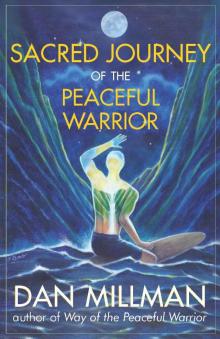 SACRED JOURNEY OF THE PEACEFUL WARRIOR
SACRED JOURNEY OF THE PEACEFUL WARRIOR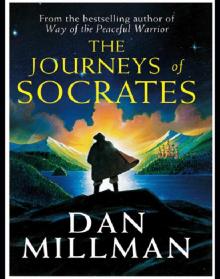 The Journeys of Socrates: An Adventure
The Journeys of Socrates: An Adventure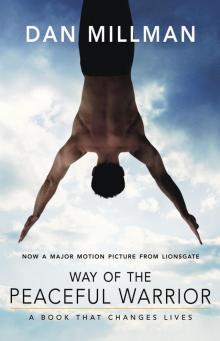 WAY OF THE PEACEFUL WARRIOR: A Book That Changes Lives
WAY OF THE PEACEFUL WARRIOR: A Book That Changes Lives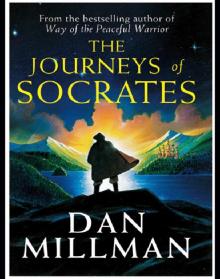 The Journeys of Socrates
The Journeys of Socrates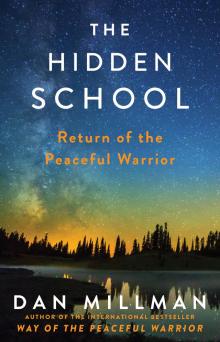 The Hidden School
The Hidden School